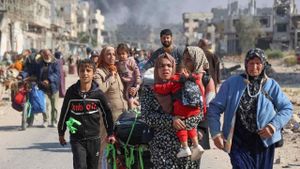Dublin, Ireland—The civil trial against Conor McGregor, one of the world’s most notorious mixed martial arts (MMA) fighters, centers around serious allegations made by Nikita Hand, who claims she was raped by McGregor over four years ago after a Christmas night out.
The trial, taking place at the Dublin High Court, has drawn significant public interest, not just because of McGregor's fame, but due to the nature of the accusations and the details revealed during the courtroom proceedings. Throughout the trial, McGregor has maintained his innocence, categorically denying all charges, stating the sexual encounters were consensual.
McGregor’s testimony has admitted to drug use on the night of the alleged incident. During cross-examination, the fighter revealed he had cocaine available but argued convincingly: “These allegations are lies, they’re false.” He attested to being “beyond petrified” when he faced police questioning shortly after the event, refusing to answer more than 100 questions as per his lawyer’s advice. McGregor described being thrown off by the situation surrounding the accusations, calling it “alien.” While under oath, he suggested Ms. Hand had consensual sex with James Lawrence, his co-defendant, which she firmly denies.
Nikita Hand claims the incident involved choking—she alleges McGregor assaulted her by choking her three separate times before engaging in sexual acts against her will. Medical evidence presented includes testimony from a paramedic who noted severe bruising on Ms. Hand at the time she sought treatment. This bruising was described as significant enough to provoke concern. A distinct piece of medical evidence mentioned during the trial involved forceps being used to remove a tampon from Ms. Hand after the alleged sexual assault. McGregor challenged this aspect, insisting she wasn’t wearing anything at the time of their encounter and speculating, without confirmation, about the tampon's relevance.
The civil trial is unique from criminal proceedings as it does not automatically grant anonymity to either party involved—this lack of anonymity has heightened the spotlight on both McGregor and Hand. Seeking financial restitution, Nikita Hand has stated she is pursuing damages for the trauma she claims to have experienced since the event. Her case argues for loss of earnings and emotional distress as notable factors.
James Lawrence, acting as co-defendant, testified about his encounters with Ms. Hand, maintaining they were consensual and asserting she was the one who initiated their interactions. He expressed disappointment when faced with allegations of being McGregor’s “fall guy,” asserting his commitment to his family values and the seriousness with which he takes such accusations. Yet, Ms. Hand has stated she lacks memory of any consensual sexual encounters with Lawrence, underscoring her claim of having told him about McGregor's alleged sexual assault.
The trial has already seen the testimonies of various witnesses, among them medical professionals who provided their insights on signs of potential trauma. One notable figure, Dr. Basil John Farnan, the former principal forensic medical officer for Northern Ireland, was called to clarify details surrounding the nature and appearance of bruises, noting how they can take time to develop and vary widely. The trial, having presented over eight days of evidence, is approaching its conclusion, with both parties expected to deliver closing arguments soon.
The Dublin High Court trial reflects broader societal challenges related to sexual assault allegations, celebrity impacts, and the pursuit of justice within civil and judicial frameworks. With media coverage intensifying as the case progresses, observers remain glued to the courtroom, awaiting the jury’s ultimate decision. McGregor’s defense emphasizes his standing: he is innocent until proven guilty, and his silence during the police interrogation cannot imply consent or wrongdoing; this legal standpoint is especially pertinent as the jury considers what they have heard.
Despite the serious nature of the allegations, the trial encapsulates all the dramatic and often conflicting narratives surrounding celebrity culture, personal claims, and legal battles. The outcome is anticipated to not only affect those directly involved but also resonate within wider discussions of accountability and the justice system's role.
The civil trial, which began following the conclusion of criminal proceedings initiated by the Director of Public Prosecutions (DPP) denying to press charges, illuminates the complex dynamics of such cases where public figures find themselves embroiled in serious allegations, and society grapples with these difficult issues of trust, truth, and consequence. With McGregor denying the entirety of Ms. Hand’s allegations and presenting his version of events within the courtroom, the stage is set for the jury’s deliberation and the impact it may have on public perception moving forward.



